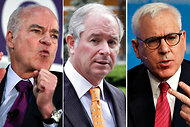 Shannon Stapleton/Reuters, Mark Lennihan/Associated Press and Fred Prouser/ReutersFrom left, Henry Kravis of Kohlberg Kravis Roberts, Stephen Schwarzman of the Blackstone Group and David Rubenstein of the Carlyle Group.
Shannon Stapleton/Reuters, Mark Lennihan/Associated Press and Fred Prouser/ReutersFrom left, Henry Kravis of Kohlberg Kravis Roberts, Stephen Schwarzman of the Blackstone Group and David Rubenstein of the Carlyle Group.
It is a $1 trillion game: Use It or Lose It.
The private equity world is sitting on that 13-figure sum. It’s what the industry calls dry powder. If they don’t spend their cash pile snapping up acquisitions soon, they may have to return it to their investors.
Nearly $200 million from funds raised in 2007 and 2008 alone needs to be spent in the next 12 months or it must be given back.
DealBook Column
View all posts
Private equity executives, after spending the last several years largely on the sidelines amid the economic uncertainty — often proclaiming “patience” as an explanation — have begun to be anxious that they may need to go on a shopping spree. At least two major private equity firms, according to two executives involved in the discussions, have held internal strategy sessions in recent weeks about how to approach the looming deadline.
Some private equity firms have put the word out to Wall Street banks that they want to go “elephant hunting” — seeking big deals worth as much as $10 billion — and are willing to pay a special bounty for bringing them acquisition targets.
At least one firm has gone so far as to begin contemplating asking its investors, which include the nation’s largest pension funds, to extend the deadline for the money to be spent in return for certain concessions on fees. (Of course, they don’t return the fees that have been collected thus far).
“The clock is ticking loudly for these funds,” Hugh MacArthur, the head of Bain Company’s private equity practice, wrote as the lead author of a report on the state of the industry.
So the race is on.
But, of course, there is a problem: “Burning off the aging dry powder will likely result in too much capital chasing too few deals throughout 2012,” according to Mr. MacArthur.
That means it is possible we could see a series of bad deals with even worse returns.
Already, private equity firms have been quietly spending lots of cash. In the third quarter alone, private equity firms in the United States burned through $45 billion, up from $17.1 billion in the previous quarter, according to Capital IQ, which tracks deals data. Carlyle Group, which had its initial public offering earlier in May, has been the busiest firm this year: it has done 11 deals worth almost $12 billion.
Acquisition prices are also likely to balloon because of “lots of firms bidding for the same obvious deals,” Alastair Gibbons, a senior partner at Bridgepoint Capital, told Triago, a fund-raising services firm that publishes a widely read quarterly newsletter. “Since there is near record dry powder globally, it’s entirely plausible that we’ll see increasingly overcrowded bidding processes.”
Richard Peterson, an analyst for SP Capital IQ’s Global Markets Intelligence group, said that private equity firms are already paying multiples of Ebitda — earnings before interest, taxes, depreciation and amortization — of 10.6 this year, up from 10.3 last year. It’s worth remembering that many of the most successful deals in the private equity industry were bought for six to eight times Ebitda, he said.
He noted, however, that since firms were able to borrow at unheard-of low rates today “it may give them more confidence to pay a little bit more.”
Perhaps in a sign of desperation, many private equity firms have been increasingly engaged in a game of “hot potato” with one firm selling a business to another — known as a secondary deal. Mr. Peterson said that at the current pace, the industry was expected to spend a record-breaking $22.3 billion this year simply buying companies from each other rather than buying businesses from the public markets or from private owners outside the private equity industry.
Mr. Peterson also raised a question that is often being whispered about but rarely said aloud: “A lot of these firms are publicly traded now. So to what degree are the transactions being driven by earnings objectives?”
Many of the big private equity firms — Apollo Group, Kohlberg Kravis Roberts, Blackstone Group and Carlyle Group, among them — are public. And for the first time, it is possible that the interests of the public shareholders could diverge from the interests of the investors in the buyout funds, at least in the short term.
If the private equity firms don’t spend the money that they have already raised, it is unlikely they will be able to raise even more in coming years. And increasingly, the private equity firms have become dependent on the management fees not just to keep the lights on but to expand their businesses into other areas, in part to diversify, which has been part of the pitch to public investors. The biggest firms have become asset gatherers.
“In a nutshell, 95 percent of funds would be affected and see a big drop in fee income based on not investing all of the committed capital,” according to Tim Friedman, director of North America for Preqin, which tracks private equity fund-raising and deals. He said that he did not expect firms to do deals simply “for the sake of it,” but he also cautioned that the firms were “under a lot of pressure.”
So keep an eye out for megadeal headlines — and whether they command the same prices when the companies are sold.
Article source: http://dealbook.nytimes.com/2012/10/01/more-money-than-they-know-what-to-do-with/?partner=rss&emc=rss
